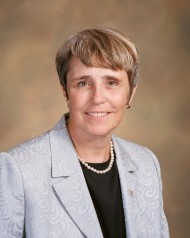From biologist to poet: Rowan associate dean takes a path less traveled
From biologist to poet: Rowan associate dean takes a path less traveled
May 8, 2008

Normally, it wouldn't be a big deal for Dr. Pat Mosto, Rowan University's interim associate dean for the College of Liberal Arts and Sciences, to have her work published. Like any good college professional, she publishes frequently.
Her most recent endeavor, however, is a bit of change of direction for the biologist from Argentina.
"I've been writing poetry since I was 13 years old," said Mosto, who saw a book of her Spanish poems published last fall. "I never submitted them anywhere because I didn't think they were good enough to publish."
When she finally let a colleague--Dr. Tony Robb, an expert in female Latin American writers--take a look, he convinced her otherwise. With Robb as editor, the two quickly found a publisher to put the book out. Mosto enlisted another Rowan professor, Susan Bowman, to handle the design.
Robb sees the book as a strong debut for Mosto, who came to the United States in 1976.
"The publication of her first poetry book establishes Mosto as one more emerging voice of contemporary Argentinean poetry," he said.
Mosto welcomed the book as a chance to tackle a subject outside of her academic work. "I have hundreds of things published in biology, but this is a personal accomplishment," she said. "It's such a powerful accomplishment for me."
Emotional poems about nature, feelings and locations fill "Senderos de Anoranzas," which translates into "Paths of Longings" in English.
"Longing is a feeling you can get from poetry," Mosto said. "My poems are sad. The theme of not getting what I want-in feelings, in love-is constant."
To complement that theme, Mosto included some of her drawings in the book, which is organized according to different time periods in her life.
"The drawings were done not specifically for the poems, but to match what that period in my life meant," she said.
And as for the poems?
"Poems come to me when I'm sitting, when I'm reading, when I'm under my tree in my yard. It's a flow-and I have to put it on paper."
That flow can come in her native Spanish, or in English. For Mosto, a Pitman resident, each language has its own indefinable qualities that suit her poems.
"Sometimes there's more color in Spanish, and sometimes there's more color in English," she said. "Some people ask me to translate-from Spanish to English or from English to Spanish-and it's even impossible for me. There's a difference but I don't know how to pinpoint it."
As big as the difference between the languages is, the difference between biology and poetry is even bigger. For Mosto, who holds degrees in environmental science from Drexel University and the University of Buenos Aires in Argentina, that's one of the things she enjoys most about it. It's an escape from her daily activities, and a chance to embrace another side of herself.
"This is not biology at all," she laughed, flipping through her book. "It has nothing to do with biology. And I love it."
Her most recent endeavor, however, is a bit of change of direction for the biologist from Argentina.
"I've been writing poetry since I was 13 years old," said Mosto, who saw a book of her Spanish poems published last fall. "I never submitted them anywhere because I didn't think they were good enough to publish."
When she finally let a colleague--Dr. Tony Robb, an expert in female Latin American writers--take a look, he convinced her otherwise. With Robb as editor, the two quickly found a publisher to put the book out. Mosto enlisted another Rowan professor, Susan Bowman, to handle the design.
Robb sees the book as a strong debut for Mosto, who came to the United States in 1976.
"The publication of her first poetry book establishes Mosto as one more emerging voice of contemporary Argentinean poetry," he said.
Mosto welcomed the book as a chance to tackle a subject outside of her academic work. "I have hundreds of things published in biology, but this is a personal accomplishment," she said. "It's such a powerful accomplishment for me."
Emotional poems about nature, feelings and locations fill "Senderos de Anoranzas," which translates into "Paths of Longings" in English.
"Longing is a feeling you can get from poetry," Mosto said. "My poems are sad. The theme of not getting what I want-in feelings, in love-is constant."
To complement that theme, Mosto included some of her drawings in the book, which is organized according to different time periods in her life.
"The drawings were done not specifically for the poems, but to match what that period in my life meant," she said.
And as for the poems?
"Poems come to me when I'm sitting, when I'm reading, when I'm under my tree in my yard. It's a flow-and I have to put it on paper."
That flow can come in her native Spanish, or in English. For Mosto, a Pitman resident, each language has its own indefinable qualities that suit her poems.
"Sometimes there's more color in Spanish, and sometimes there's more color in English," she said. "Some people ask me to translate-from Spanish to English or from English to Spanish-and it's even impossible for me. There's a difference but I don't know how to pinpoint it."
As big as the difference between the languages is, the difference between biology and poetry is even bigger. For Mosto, who holds degrees in environmental science from Drexel University and the University of Buenos Aires in Argentina, that's one of the things she enjoys most about it. It's an escape from her daily activities, and a chance to embrace another side of herself.
"This is not biology at all," she laughed, flipping through her book. "It has nothing to do with biology. And I love it."